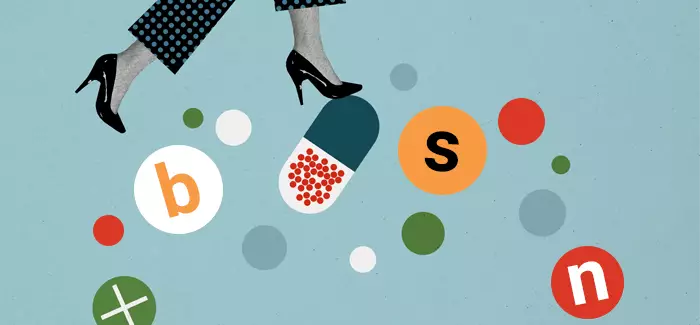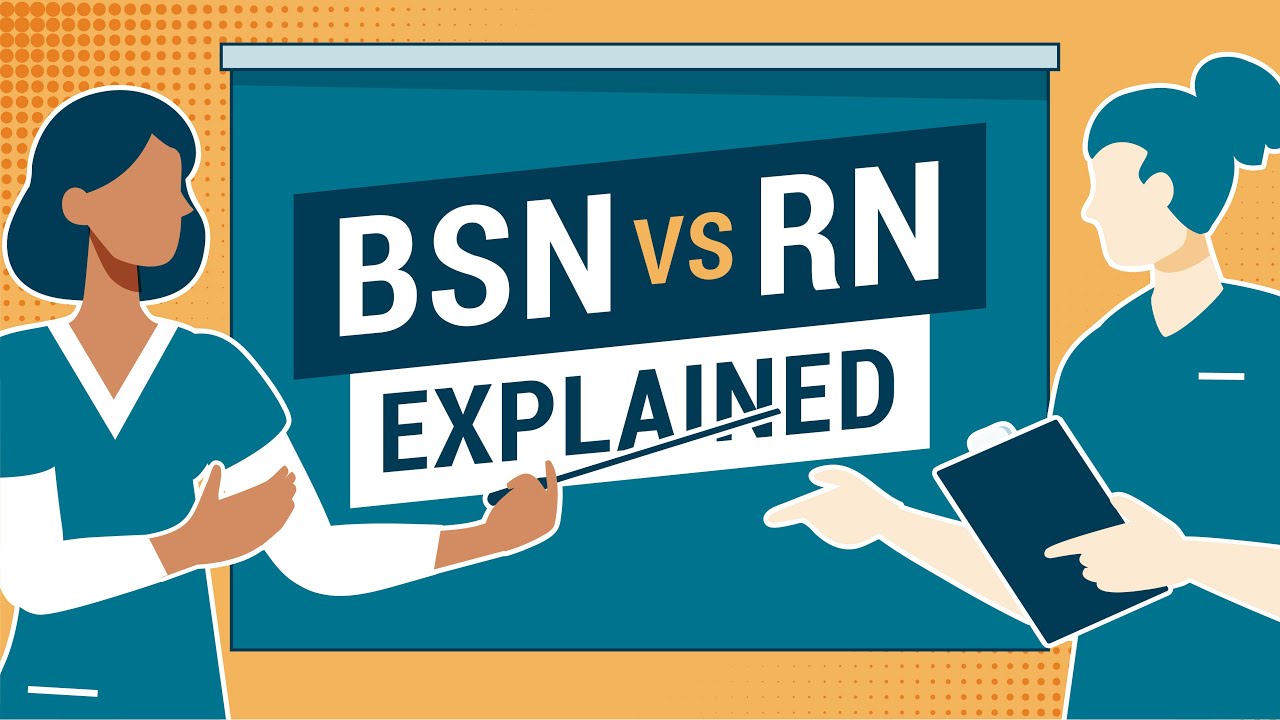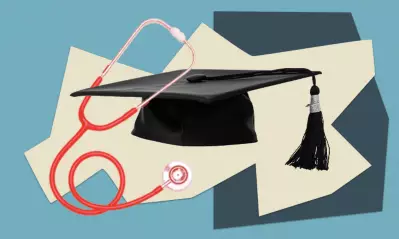What is a BSN vs. RN?
This article was updated on January 26, 2024.

Written by Michael Feder

This article was reviewed by Raelene Brooks, Dean, College of Nursing.

If you’re a registered nurse (RN) or have been curious about the nursing field, you may have wondered: What is a BSN? Let's look at the differences between an RN and BSN.
What is a BSN and how does it relate to an RN?
When looking at what is a BSN vs RN, it important to know that RN refers to a license, while BSN is a degree.
What is an RN?
The abbreviation “RN” refers to “registered nurse.” An RN is a medical professional licensed by a state board of nursing who provides and coordinates patient care and offers patients, families and communities information and emotional support.
Registered nurses can specialize in various fields, from oncology (the study of cancer) to emergency room medicine to public health. They may also pursue a career outside a hospital or clinic, such as in a rehabilitation center or home-care service.
Several educational pathways are available to become an RN, such as an Associate Degree in Nursing (ADN), a diploma from an approved nursing program or a bachelor’s level program. The U.S. Bureau of Labor Statistics (BLS) explains that nurses must also be licensed by the state where they work.
All states administer the same national licensing exam, the National Council Licensure Examination for Registered Nurses (NCLEX-RN), and they all have the same standard for passing, notes the National Council of State Boards of Nursing. Aspiring nurses must receive candidacy through completion of a pre-licensure program in order to sit for the NCLEX. They must then pass the NCLEX to receive licensure.
What does a registered nurse do?
A registered nurse’s roles and responsibilities can depend on where the RN works and what field the RN specializes in.
Generally speaking, however, BLS notes the following responsibilities are typical for an RN:
- Assess patient conditions
- Record medical histories and symptoms
- Assist with performing diagnostic tests and analyzing the results
- Administer medicine and treatment
- Establish plans for patient care or contribute to existing plans
- Operate and monitor medical equipment
- Educate patients, families and communities about how to manage illnesses or injuries
Registered nurses also work in tandem with physicians and other healthcare providers, and they may oversee nursing professionals such as licensed practical nurses (LPNs), nursing assistants and home health aides.
RN salary
The salary range for RNs depends on a variety of factors. Experience, education and where you work (both in terms of venue and of the city) affect salaries in multiple ways. As of May 2023, it was reported that RNs made an annual salary ranging between $63,720 and $132,680, with a median wage of $86,070, according to BLS.
Salary ranges are not specific to students or graduates of University of Phoenix. Actual outcomes vary based on multiple factors, including prior work experience, geographic location and other factors specific to the individual. University of Phoenix does not guarantee employment, salary level or career advancement. BLS data is geographically based. Information for a specific state/city can be researched on the BLS website.
What is a BSN nurse degree?
A BSN refers to a four-year, postsecondary degree program for nurse who already RNs. Some BSN programs lead to licensure while others are designed for licensed nurses seeking to enhance their education. Others require you to have your RN license before enrolling.
What does BSN stand for?
“BSN” stands for Bachelor of Science in Nursing, a degree program that addresses both general education courses and specific nursing curriculum.
A BSN often covers skills like:
- Care coordination
- Health administration
- Quality improvement and case management
- Clinical prevention and population health
- Leadership
Students can earn a BSN at an in-person college or university, but online nursing degrees can offer the same program quality with a more flexible format.
Why would I need a BSN?
RNs don’t have to have a BSN to work as a nurse — unless they live in New York state. In 2017, the New York state enacted legislation dubbed “BSN in 10,” which requires all nurses to obtain their bachelor’s degree in nursing within 10 years of receiving their RN license.
A BSN lays the necessary foundation to pursue new opportunities within nursing, such as administrative positions, research, consulting and teaching.
Additionally, a BSN-educated nurse is positioned to pursue a master’s degree, which is necessary for working as a nurse practitioner or other type of advanced practice registered nurse (APRN).
What is the difference between an RN and a BSN?
The difference between an RN and a BSN is that the RN is a professional role that requires licensure while the BSN is a nursing education degree program.
To become an RN, you can earn a diploma in nursing, an Associate Degree in Nursing (ADN) or a BSN designed to prepare graduates for licensure. All of these programs, BLS notes, include supervised clinical experience and science courses, but the BSN also covers topics like communication, leadership and critical thinking.
BLS adds: “Generally, licensed graduates of any of the three types of education programs (bachelor’s, associate or diploma) qualify for entry-level positions as a staff nurse. However, employers — particularly those in hospitals — may require a bachelor’s degree.”
Can you become an RN without a BSN?
As outlined above, you can become an RN without a BSN in most states. Considered by some to be the gold standard, potential advantages of a BSN include more comprehensive knowledge, potential leadership roles and an opportunity for advancement. It is also important to note that some hospitals or healthcare providers may prefer or even require their RNs to have a bachelor’s degree.
How long does it take to get a BSN?
A traditional BSN can take up to four years without experience or previous education. However, the University of Phoenix RN to BSN program can be completed much faster since students receive academic credit for the learning achieved on the way to getting their RN license.
The RN to BSN program at University of Phoenix takes approximately 14 months to complete with the transfer of 87 credits if you have your ADN. For those who do not have an ADN, RNs typically receive 40 total credits for their prior learning experience.
The competency-based (CB) version of the same RN to BSN program can be completed in as little as 12 months. For the CB program, students must have an acceptable associate degree that covers all their general education requirements as well as have an RN license and meet the experience requirements
Post-BSN degree and career options
Whether you see yourself specializing in a specific nursing field, taking on more administrative roles or just being more flexible in the types of roles you can occupy, it helps to know what a BSN can potentially do for you and what nurses can do after earning their bachelor’s degree to enhance their career. As highlighted earlier, registered nurses can learn leadership skills through an RN to BSN program that they can apply to their hands-on patient care and clinical experience. A BSN program also focuses on how to implement an effective evidence-based practice, leadership and population health. No wonder a BSN can signal to employers and hiring managers that a nurse has the foundational skills to take on more responsibility. (Not to mention the degree can be a requirement for managerial or supervisor roles within a hospital.)
As you consider some career options available to RNs with a BSN, think about your ultimate life and career goals and how those pathways align (or not). Here, we’ll take a closer look at what comes next after earning a Bachelor of Science in Nursing.
BSN career paths
Here are some potential career paths available to registered nurses after completing a BSN:
Charge nurse
Overview: Charge nurses are generally RNs or licensed practical nurses (LPNs) with extensive clinical experience. They are responsible for providing general quality care while also overseeing a team of nurses working in a ward of the healthcare facility or, sometimes, providers in the entire facility. They ensure the nursing team they oversee administers the highest quality patient care possible while taking on managerial and supervisory responsibilities such as managing and adjusting patient assignments during shifts and responding in emergencies.
Job requirements: Charge nurses must be registered nurses or LPNs with significant clinical experience, having earned at least a nursing diploma, ASN or ADN. These positions generally require RNs to have clinical work experience, and some employers prefer candidates to have a BSN.
Public health nurse
Overview: Public health nursing is a broad category of nursing that generally deals with issues that affect a community. This includes immunizing the public against diseases, managing opioid addiction treatment, and providing patient care after natural disasters. Public health nurses can also advocate for better health practices in their community.
Job requirements: Completing an accredited nursing program is a common prerequisite for working as a specific type of nurse. In addition, public health nurses must meet the requirements of being a registered nurse, and typically be working as an RN for at least two years. University of Phoenix nursing programs do not have the type of accreditation required for some public health nursing positions.
Director of nursing (DON)
Overview: Directors of nursing are advanced professionals who lead nursing departments within a healthcare system. Duties for this role can include:
- Goal development for their teams
- Regulatory and legal compliance
- Budget preparation and monitoring
- Nurse recruitment, training and supervision
- Creation of work schedules for nursing staff
- Monitoring quality and safety of patient care
Job requirements: Nursing directors usually have years of bedside clinical experience as an RN. Other qualities they typically must possess include strong communication and leadership skills and a strong attention to detail. RNs can become a DON through experience, continuing education and good performance. While some RNs may be able to pursue a director of nursing role with a BSN, some companies prefer or require employees to possess a master’s degree, such as a master’s degree in Nursing (MSN).
Some employers even prefer nursing directors to have a doctoral degree, although it’s not always a requirement.
What is a BSN degree program?
You’ve read many details answering the question: What is a BSN? But you may still want to know whether you can pursue this diploma through an online program? The answer is yes. University of Phoenix offers nursing degrees for RNs:
Need more information? Contact UOPX.

ABOUT THE AUTHOR
A graduate of Johns Hopkins University and its Writing Seminars program and winner of the Stephen A. Dixon Literary Prize, Michael Feder brings an eye for detail and a passion for research to every article he writes. His academic and professional background includes experience in marketing, content development, script writing and SEO. Today, he works as a multimedia specialist at University of Phoenix where he covers a variety of topics ranging from healthcare to IT.

ABOUT THE REVIEWER
Dr. Raelene Brooks, dean of the College of Nursing, has been a registered nurse for more than 25 years and practiced extensively in the areas of ICU, trauma and critical care. Her publications include a focus on nursing education, critical care, and organizational wellness and engagement. She is a leader in creating, guiding and launching innovative curriculum.
This article has been vetted by University of Phoenix's editorial advisory committee.
Read more about our editorial process.



